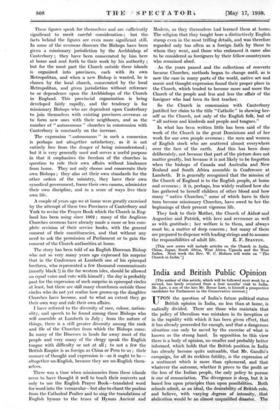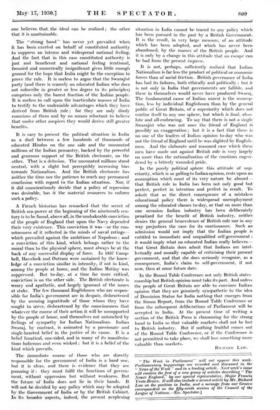India and British Public Opinion
[The author of this article, which will be followed next week by a second, has lately returned from a four months' visit to India. Mr. Law; a son of the late Mr. Bonar Law, is himself a prospective candidate for Parliament in the Conservative interest.] UPON the question of India's future political status British opinion in 'India, no less than at home, is radically divided. There are those who maintain that the 'policy of liberalism was mistaken in its inception or in the rapidity with which it has been given eEect, that it has already proceeded far enough, and that a dangerous situation- can only be saved by the exercise of what is known as the strong hand. In opposition to this view there is a body of opinion, no smaller and probably better informed, which holds that the British position-in India has already become quite untenable, that Mr. Gandhi's campaign, for all its reckless futility, is the expression of a sentiment which is more than ephemeral, and -that whatever the outcome, -whether it prove to the profit or the loss of the Indian people, the only policy to pursue is one of renunciation. The divergence is deep, but it is based less upon principles than upon possibilities. Both schools admit, as an ideal, the desirability of British rule, and believe, with •varying degrees of intensity, that abdication would be an almost• unqualified disaster. The one believes, that the ideal can be realized ; the other that it is unattainable.
The "strong hand" has never yet prevailed when it has been exerted on behalf of constituted authority to suppress an intense and widespread national feeling. And the fact that in this case -constituted authority is just and beneficent and national feeling irrational, frenzied and numerically insignificant gives little enough ground for the hope that India might be the exception to prove the rule. It is useless to argue that the Swarajist party (and there is scarcely an educated Indian who does not subscribe in greater or less degree to its principles) coMprises Only the barest fraction of the Indian people. It is useless to call upon the inarticulate masses of India to testify to the undeniable advantages which they have derived from British rule ; for they are only dimly conscious of them and by no means reluctant to believe that under other auspices they would derive still greater benefits.
It is easy to preient the political situation in India as a duel between a few hundreds of thousands of educated • Hindus on the one side and the uncounted millions of the Indian peasantry, backed by the powerful and generous support of the British electorate, on the other. That is a delusion. The uncounted millions stand neutral, with a slight but perceptibly increasing bias towards Nationalism. And the British electorate has neither the time nor the patience to reach any permanent conclusion with regard to the Indian situation. Nor, if it did conscientiously decide that a policy of repression was desirable, has it the material resources to enforce such a policy.
A French historian has remarked that the secret of British sea-power at the beginning of the nineteenth cen- tury is to be found, above all, in the unshakeable conviction of the people of England that upon the Navy depended their very existence. This conviction it was—or the con- sciousness of it reflected in the minds of naval ratings— which prevailed 'against the ambitions of Napoleon ; and a conviction of this kind, which belongs rather to the Moral than to the physical sphere, must alWays be at the back of any successful display of force. In 1857 Camp bell, Havelock and Outram were sustained by the know- ledge of a conviction similar in intensity, if not in kind, among the people at home, and the Indian Mutiny was suppressed. -But to-day, at a time far more critical, Conviction is on the other .side. The British electorate is weary and apathetic, and largely ignorant of the issues at stake. The few thousand Englishmen who are respon- sible for India's government are in despair, disheartened by the seeming ingratitude of those whom they have sought to serve, disheartened by the consciousness that whatever the course of their action it will be unsupported by-the people at home, and themselves not untouched by feelings of sympathy for Indian Nationalism. Indian Swaraj, by contrast, is animated by a passionate and single-hearted belief in the justice of its cause. It is, a belief fanatical, one-sided, and in many of its manifesta- tions ludicrous and even wicked ; but it is a belief of the kind which prevails.
The immediate course- - of those -who- are directly responsible for the government of India is a hard one, but it is :elear, and there is. evidence that they are pursuing. it : they must- fulfil the functions of govern- ment, without oppression but without weakness. But the - -future Tot India -does not lie in their hands. It will not- be. decided by any policy which may be adopted by: the ,.Government of -India or by the British Cabinet. In; fits :brissder :aSpects,, indeed,- the preSent perplexing situation in India cannot be traced to any policy which has been pursued in the past by a British Government. It is the result, in very large measure, of an attitude which has been adopted, and which has never been abandoned, by the masses of the British people. And it is only by a change in this attitude that an escape can be had from the present impasse.
It is not, perhaps, sufficiently realized that Indian Nationalism is far less the product of political or economic forces than of social friction. British governance of India has had its failures, both ethically and politically ; but it is- not only in India that governments are fallible, and these in themselves would never have produced Swaraj, The fundamental cause of Indian unrest is the assump- tion, less by individual Englishmen than by the general public of Great Britain, of a superiority which does not confine itself to any one sphere, but which is final, abso- lute and all-embracing. To say that there is not a single Swarajist who was not 'once the friend of England is possibly an exaggeration ; but it is a fact that there is no one of the leaders of Indian opinion to-day who was not the friend of England until he was slighted by English- men. And the elaborate and reasoned case which these men have made out against British rule is very largely no more than the rationalization of the emotions engen- dered by a bitterly wounded pride.
In the purely political sphere this attitude of sup- eriority, which is so galling to Indian opinion, rests upon an assumption which must of its very nature be absurd— that British rule in India has been not only good but perfect, perfect in intention and perfect in result. To admit that as the direct consequence of a mistaken educational policy there is widespread unemployment among the educated classes to-day, or that on more than one occasion Indian industry has been deliberately penalized for the benefit of British industry, neither denies the general benevolence of British rule nor in any way prejudices the case for its continuance. Such an admission would not imply that the Indian people is entitled to immediate and unqualified self-government : it would imply what no educated Indian really believes— that Great Britain does admit that Indians are intel- lectually and morally capable of criticizing their present government, and that she does seriously recognize, as a consequence, India's claim to self-government, if not now, then at some future date.
In the Round Table Conference not only British states manship but British opinion must take its part. And unless the people of Great Britain are able to convince Indian opinion that they are genuinely sympathetic to the idea of Dominion Status for India nothing that emerges from the Simon Report, from the Round Table Conference or from the subsequent deliberations of Parliament will be accepted in India. At the present time of writing a section of the British Press is clamouring for the strong hand in India so that valuable markets shall not be lost to British industry. But if nothing fruitful comes out of the Round Table Conference, or if the Conference is not permitted to take place, we shall lose something more valuable than markets.
RicnAHD LAW. '















































 Previous page
Previous page